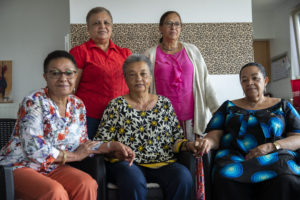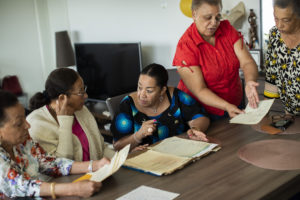
FILE – In this Monday, June 29, 2020 file photo, clockwise from top left, Simone Ngalula, Monique Bitu Bingi, Lea Tavares Mujinga, Noelle Verbeeken and Marie-Jose Loshi pose for a group photo during an interview with The Associated Press in Brussels. Five biracial women born in Congo when the country was under Belgian rule who were taken away from their Black mothers and separated from their African roots are suing the Belgian state for crimes against humanity. The case is being examined on hursday, Oct. 14, 2021 by a Brussels court. (AP Photo/Francisco Seco, File)
‘BRUSSELS (AP) — A court in Brussels has started considering a crimes against humanity lawsuit brought by five biracial women who were born in Congo and taken away from their Black mothers when they were little and the country was under Belgian colonial rule.
Lea Tavares Mujinga, Monique Bintu Bingi, Noelle Verbeken, Simone Ngalula and Marie-Jose Loshi are suing the Belgian state in hopes it will recognize its responsibility for the suffering of thousands of mixed-race children. Known as “metis,” the children were snatched away from families and placed in religious institutions and homes by Belgian authorities that ruled Congo from 1908 to 1960.
“My clients were abducted, abused, ignored, expelled from the world,” lawyer Michele Hirsch said Thursday as a court in the Belgian capital examined the civil case. “They are living proof of an unconfessed state crime, and soon there will be no one left to testify.”
The five women have requested compensation of 50,000 euros ($55,000) each.. The court is expected to deliver a verdict within six weeks.
The five women, all born between 1945 and 1950, filed their lawsuit last year amid growing demands for Belgium to reassess its colonial past.
In the wake of protests against racial inequality in the United States, several statues of former King Leopold II, who is blamed for the deaths of millions of Africans during Belgium’s colonial rule, have been vandalized in Belgium, and some have been removed.
In 2019, the Belgian government apologized for the state’s role in taking thousands of babies from their African mothers. And for the first time in the country’s history, a reigning king expressed regret last year for the violence carried out by the former colonial power.
Hirsch said Belgium’s actions are inadequate to what her clients experienced.
“The Belgian state did not have the courage to go all the way, to name the crime, because its responsibility incurred damages,” the lawyer said.. “Apologies for history, yes, but reparations to the victims, no.”
Lawyers say the five plaintiffs were all between the ages of 2 and 4 when they were taken away at the request of the Belgian colonial administration, in cooperation with local Catholic Church authorities.

FILE – In this Monday, June 29, 2020 file photo, from left, Marie-Jose Loshi, Monique Bitu Bingi, Lea Tavares Mujinga, Simone Ngalula and Noelle Verbeeken speak with each other as they as they look over papers during an interview with The Associated Press in Brussels. Five biracial women born in Congo when the country was under Belgian rule who were taken away from their Black mothers and separated from their African roots are suing the Belgian state for crimes against humanity. The case is being examined on hursday, Oct. 14, 2021 by a Brussels court. (AP Photo/Francisco Seco, File)
According to legal documents, in all five cases the fathers did not exercise parental authority, and the Belgian administration threatened the girls’ Congolese families with reprisals if they refused to let them go.
The children were placed at a religious mission in Katende, in the province of Kasai, with the Sisters of Saint Vincent de Paul. There, they lived with some 20 other mixed-race girls and Indigenous orphans in very hard conditions.
According to the lawyers, the Belgian state’s strategy was aimed at preventing interracial unions and isolating métis children, known as the “children of shame,” to make sure they would not claim a link with Belgium later in their lives.
Legal documents claim the children were abandoned by both the state and the church after Congo gained independence, and that some of them were sexually molested by militia fighters.
“If they are fighting for this crime to be recognized, it is for their children, their grandchildren. Because the trauma is transmitted from generation to generation,” Hirsch said Thursday. “We ask you to name the crime and to condemn the Belgian state.”
